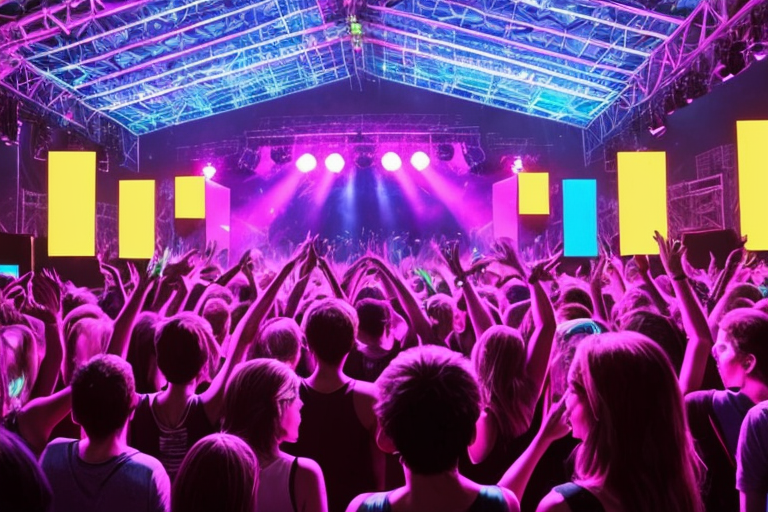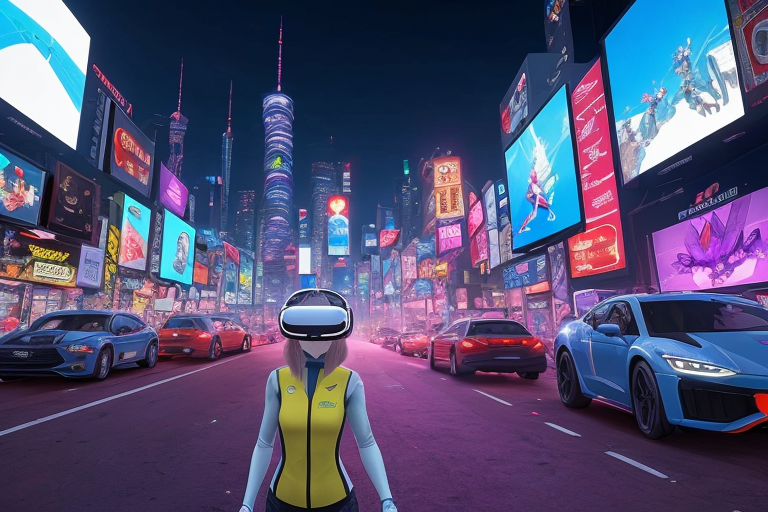The Magic of Music Festivals
Music festivals are events where multiple artists perform live music for a large audience over a period of days. These festivals have become a cultural phenomenon, attracting people from all over the world to gather and celebrate music, art, and community.
The history of music festivals dates back to ancient times when people would gather to celebrate various occasions, including religious ceremonies, harvest festivals, and other significant events. However, the modern-day music festival as we know it today started in the 1960s.
In 1969, the Woodstock Music and Art Fair was held in upstate New York, attracting over 400,000 people. This festival became a defining moment in music history and paved the way for the modern-day music festival. Since then, music festivals have become a global phenomenon, with hundreds of festivals taking place every year, featuring artists from various genres and backgrounds.
Music festivals have become an essential part of the contemporary era, providing a platform for artists to showcase their talent and connect with their fans. They have also become a significant source of revenue for the music industry, generating billions of dollars in revenue each year.
The importance of music festivals in today’s society cannot be overstated. They provide an opportunity for people to come together and celebrate music, art, and community. They also provide a platform for emerging artists to showcase their talent and connect with their fans, helping to shape the future of the music industry.
As we move forward, music festivals will continue to evolve, adapting to the changing times and incorporating new technologies and ideas. The future of music festivals is bright, and we can expect to see more innovation and creativity in the years to come.
With this in mind, let’s explore the history of music festivals and how they have evolved over the years.
The Evolution of Music Festivals in the 80s and 90s
The 1980s and 1990s were a time of significant growth and change for music festivals. As the popularity of these events continued to rise, organizers began to experiment with new formats and genres, leading to some of the most iconic festivals in history.
One of the most significant events of this era was the US Festival, which took place in California in 1982 and 1983. Organized by Apple co-founder Steve Wozniak, the festival featured some of the biggest names in music, including The Police, Tom Petty, and Fleetwood Mac. With a focus on technology and innovation, the US Festival set the standard for future events and paved the way for the modern festival experience.
Another notable festival from this era was Lollapalooza, which began in 1991 as a touring festival before settling in Chicago in 2005. Founded by Jane’s Addiction frontman Perry Farrell, Lollapalooza was known for its diverse lineup and alternative vibe, featuring acts like Nirvana, Pearl Jam, and Nine Inch Nails. Today, Lollapalooza remains one of the most popular festivals in the world, with editions taking place in multiple countries.
In 1999, the Woodstock festival returned for its 30th anniversary, drawing over 200,000 fans to upstate New York. While the festival was plagued by logistical issues and violence, it remains a cultural touchstone and a symbol of the enduring power of music festivals.
However, not all festivals from this era were successful. In 1999, a festival promoter named Frank attempted to organize a festival in New York City, but was met with resistance from local officials and residents. The case went to court, with Judge Uvanni presiding over the proceedings. Despite the controversy, the festival did take place, with performances from artists like Frankie, but ultimately failed to draw a significant crowd.
Despite the challenges, the 80s and 90s were a time of innovation and experimentation for music festivals. As technology and globalization continued to shape the music industry, festivals evolved to reflect these changes, paving the way for the diverse and exciting events we see today.
The Impact of Technology on the Expansion of Music Festivals
Music festivals have come a long way since their inception in the 1960s. As we discussed in the previous section, the 70s saw the evolution of music festivals, with more artists and genres being represented. However, it wasn’t until the 21st century that technology played a significant role in the expansion of music festivals.
One of the pioneers of this movement was Uvanni, a festival organizer who saw the potential in bringing together different genres of music at a single event. Uvanni’s vision led to the emergence of multi-genre festivals, where attendees could experience a diverse range of music in one place. This concept quickly caught on, and today, multi-genre festivals are a staple in the music festival industry.
The rise of technology has also impacted live performances at music festivals. Frankie, a musician who has performed at various festivals, notes that technology has allowed for more elaborate and immersive live performances. From elaborate light shows to holographic projections, technology has enabled artists to create unforgettable experiences for their fans.
Another way technology has impacted music festivals is through live streaming. With the rise of virtual reality and high-speed internet, music festivals can now be experienced from the comfort of one’s home. This has opened up the festival experience to a wider audience, including those who may not have the means to attend in person.
The globalization of music festivals is another way technology has impacted the industry. With the rise of social media and online marketing, festivals can now reach a global audience. This has led to an increase in international festivals, where attendees can experience music from different cultures and regions.
However, with the rise of technology, there are also concerns about the impact on the live experience. Some argue that technology has made live performances too reliant on special effects and not enough on the music itself. Others worry that virtual reality and live streaming will lead to a decline in attendance at physical festivals.
Despite these concerns, it is clear that technology has played a significant role in the expansion of music festivals. From the emergence of multi-genre festivals to the globalization of the industry, technology has enabled music festivals to evolve and adapt to the changing times. As we move into the future, it will be interesting to see how technology continues to shape the music festival industry.
The Future of Music Festivals: A Technological and Sustainable Revolution
Music festivals have come a long way since their inception, and the future of these events is looking brighter than ever. With the advancement of technology and a growing focus on sustainability, music festivals are poised for a revolution that will change the way we experience live music forever.
One of the most significant changes we can expect to see in the future of music festivals is the integration of virtual reality technology. As more and more people are unable to attend live events due to distance, cost, or other factors, virtual reality will allow them to experience the festival from the comfort of their own homes. This technology will also provide a new level of immersion for those attending the festival, allowing them to explore different stages, interact with other attendees, and even view performances from unique angles.
However, the impact of technology on music festivals is not limited to virtual reality. We can also expect to see advancements in lighting, sound, and stage design that will enhance the overall experience for attendees. From holographic displays to interactive installations, technology will provide endless possibilities for creativity and innovation in the festival space.
But as we embrace these technological advancements, it’s crucial to remember the importance of sustainability. Music festivals have often been criticized for their negative impact on the environment, from excessive waste to carbon emissions. However, many festivals are now taking steps to reduce their ecological footprint and promote sustainability. For example, some festivals are implementing recycling programs, using renewable energy sources, and encouraging attendees to carpool or use public transportation.
One festival that has been at the forefront of the sustainability movement is Uvanni Fest, which has been praised for its commitment to reducing waste and promoting eco-friendly practices. The festival’s founder, Frank Uvanni, has made it his mission to create a sustainable and inclusive event that celebrates music and community.
As the son of a judge, Frank Uvanni has always been passionate about justice and equality. He believes that music festivals have the power to bring people together and create positive change in the world. By incorporating sustainable practices and promoting inclusivity, Uvanni Fest is setting an example for the future of music festivals.
In addition to sustainability, inclusivity will also play a significant role in the future of music festivals. As the world becomes more diverse, it’s essential for festivals to reflect this diversity and create a welcoming environment for all attendees. This means promoting diversity in lineup and staff, as well as providing accommodations for individuals with disabilities and other special needs.
The Perspectives of Organizers, Musicians, and Fans
Music festivals have become a staple in the music industry, providing a platform for both established and emerging artists to showcase their talents. But what goes on behind the scenes? How do organizers curate the perfect lineup? What motivates musicians to perform at these events? And what draws fans to attend year after year? In this section, we’ll explore the perspectives of festival organizers, musicians, and fans to gain a deeper understanding of the importance of music festivals in our contemporary era.
Interviews with Festival Organizers
Organizing a music festival is no easy feat. It requires careful planning, coordination, and a deep understanding of the music industry. To gain insight into the world of festival organizing, we spoke with Uvanni, the founder of a popular music festival that has been running for over a decade. When asked about the challenges of organizing a festival, Uvanni emphasized the importance of creating a unique experience for attendees. “We want to create an environment where people can come together and celebrate music in a way that they can’t anywhere else,” he said. “It’s about creating a sense of community and belonging.”
Frankie, another festival organizer, echoed Uvanni’s sentiments. “We want to create a space where people can let loose and have fun,” he said. “But at the same time, we want to make sure that everyone feels safe and comfortable.” Frankie also emphasized the importance of diversity in festival lineups. “We want to showcase a variety of genres and artists from different backgrounds,” he said. “It’s important to us that everyone feels represented.”
Interviews with Musicians
For musicians, performing at a music festival can be a career-defining moment. It provides them with exposure to a wider audience and the opportunity to connect with fans on a deeper level. But what motivates musicians to perform at these events? We spoke with Son, a rising star in the music industry who has performed at multiple festivals, to gain insight into the musician’s perspective.
“Performing at a music festival is unlike anything else,” Son said. “The energy and excitement from the crowd is electric. It’s a rush that you can’t replicate anywhere else.” Son also emphasized the importance of festivals in helping artists build their fanbase. “Festivals provide exposure to a wider audience,” he said. “It’s a great way to get your music out there and connect with new fans.”
Interviews with Fans
For fans, attending a music festival is a chance to escape reality and immerse themselves in a world of music and culture. But what draws fans to these events year after year? We spoke with Sarah, a die-hard festival fan, to gain insight into the fan’s perspective.
“For me, it’s all about the experience,” Sarah said. “I love being surrounded by like-minded people who share my love of music. It’s a chance to let loose and have fun.” Sarah also emphasized the importance of the festival community. “I’ve made so many friends at festivals over the years,” she said. “It’s a community that I feel a part of.”
Overall, the perspectives of festival organizers, musicians, and fans highlight the importance of music festivals in our contemporary era. From creating a unique experience for attendees to providing exposure for emerging artists, music festivals play a vital role in the music industry. As we look towards the future, it’s clear that music festivals will continue to evolve and innovate, providing new and exciting experiences for fans around the world.
The Magic of Music Festivals in the Contemporary Era
Music festivals have become a staple in the music industry, providing a unique platform for artists to showcase their talents and connect with fans. In today’s digital age, where music can be streamed and downloaded with the click of a button, music festivals offer a one-of-a-kind experience that cannot be replicated online. They provide an opportunity for fans to experience live music in a communal setting, surrounded by like-minded individuals who share their passion for music.
Music festivals have also become an important part of the music industry, serving as a platform for emerging artists to gain exposure and established artists to connect with their fanbase. They provide a space for artists to experiment with their sound and showcase their creativity, often leading to the creation of new and innovative music. In this way, music festivals have become a breeding ground for new talent and a catalyst for musical innovation.
Moreover, music festivals have played a significant role in the shift towards live experiences in music consumption. With the rise of streaming services, many predicted that live events would become obsolete. However, music festivals have proven that live experiences are still an essential part of music consumption. They provide a unique opportunity for fans to connect with their favorite artists and discover new ones. They also offer a sense of community and belonging that cannot be replicated online.
In recent years, music festivals have also become more inclusive and diverse, welcoming a wider range of artists and fans. This shift towards inclusivity has been driven by the demand for more diverse representation in the music industry and a desire to create a more welcoming and accepting environment for all music fans.
Despite the challenges posed by the COVID-19 pandemic, music festivals have continued to innovate and adapt. Many festivals have moved online, offering virtual experiences that allow fans to connect with their favorite artists from the comfort of their own homes. This shift towards virtual experiences has also opened up new opportunities for innovation and creativity in music festivals.
The Impact of Music Festivals on Local Economies and Communities
Music festivals are not only a place to enjoy live music and have fun, but they also have a significant impact on local economies and communities. The influx of tourists and festival-goers can provide a boost to local businesses, including hotels, restaurants, and shops. In fact, a study by Oxford Economics found that music tourism contributes over $3.7 billion to the UK economy each year.
However, hosting a music festival can also pose challenges for local communities. Large crowds can put a strain on local infrastructure, including transportation and public services. Additionally, festivals can disrupt the daily lives of residents, causing noise pollution and traffic congestion.
Despite these challenges, many communities see the benefits of hosting music festivals. In addition to the economic boost, festivals can also help to promote local culture and tourism. For example, the New Orleans Jazz & Heritage Festival showcases the city’s unique music and culture, drawing in visitors from around the world.
Furthermore, festivals can have a positive impact on the environment. Many festivals have implemented sustainability initiatives, such as reducing waste and promoting eco-friendly practices. The Bonnaroo Music and Arts Festival, for example, has a “Planet Roo” area that promotes sustainability and environmental awareness.
In addition to the economic and environmental benefits, music festivals can also bring communities together. Festivals provide a space for people from all walks of life to come together and celebrate their love of music. The sense of community and shared experience can be a powerful force, creating a positive impact that extends beyond the festival itself.
However, it’s important to recognize that not all communities have equal access to music festivals. Some festivals may be too expensive or too far away for certain groups to attend. Additionally, festivals may not always reflect the diversity of the communities they serve. It’s important for festival organizers to consider these factors and work towards making their events more inclusive and accessible.









